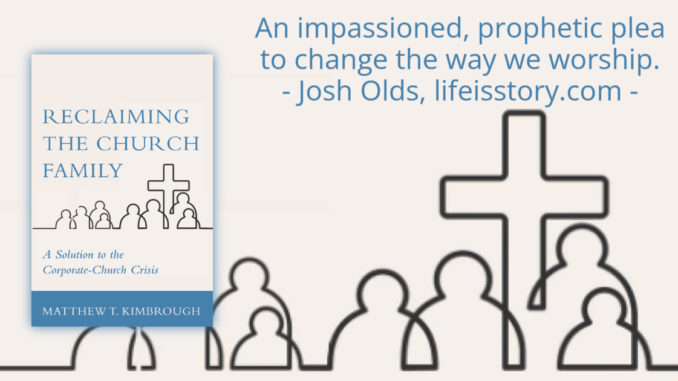
Published by Wipf and Stock on January 20, 2022
Genres: Non-Fiction, Christian Life
Buy on Amazon
Goodreads

Why bother with church? Can’t I follow Jesus on my own? Christians young and old struggle to answer these questions, believing Scripture says little about church life. But the Bible is far from silent. The New Testament envisions a vibrant church of devoted brothers and sisters adopted into God’s family. The biblical image of the church family has the power to reshape everything our local churches do—the ways pastors lead, how members engage one another, what worship leaders sing, and much more. Now is the time to reclaim a biblical vision of the church as a family and reject the prevailing corporate-church paradigm assumed by church growth gurus. The church that thinks of itself as a family will learn to build meaningful relationships and show the unbelieving world how good church life can be.
In an era of megachurches, CEO pastors, and church growth strategies—alongside a consumeristic mentality that has an eye for entertainment—the modern American church has lost its identity as family. I’m in the middle of a doctor of ministry class on transformative church leadership and the lesson structure is more befitting a Fortune 500 company. Not that the church can’t learn from the workplace or that clergy should not be professional, but rather the primary way in which the church is intended to relate to each other is not as a workplace, but as a family. In Reclaiming the Church Family, Matthew Kimbrough offers practical solutions to the corporate church crisis, gently calling churches back to their intimate roots as a family community.
Kimbrough spreads those solutions over six chapters, bookended by an introduction and conclusion:
- Insights, Not a Paradigm: The Role of Business Practices in Church Life
- The Group First, Not the Individual: The Background of Siblingship in the Early Church
- Adoption, Not Membership: The Theological Basis of the Family of God
- Growing Healthier, Not Merely Bigger: The Purpose of the Family of God
- Fighting against Division, Not One Another: The Biblical Response to Conflict
- A Parent, Not a CEO: The Leadership of the Church
Each chapter inverts some typical church principle, turning it upside down so that all the modern corporate structures fall out and we’re left with the relational core of how the church is supposed to function. The chapter titles really say it all. Kimbrough works through each chapter clearly and cogently, gently redirecting reader to a better (but much more difficult way) of doing church.
The key to the book lies in that second chapter where Kimbrough discusses the primacy of the group. American individualism has reduced church to an event to be consumed rather than a community in which one participates. If I had any criticism, it would be that I wished Kimbrough would have hit this point harder, highlighting how the corporate church is a result of capitalism and consumerism.
Reclaiming the Church Family is an impassioned, prophetic plea to change the way we worship. I think of the empty worship of the days of Amos, where the churches were full and the hearts were empty. The business of church was booming, but the fruit of church was failing. We live is those times today and Kimbrough is an Amos calling out the court priests who have commodified worship. Success, Kimbrough reminds us, is not in bigger congregations, a larger budget, or a grander building but in functioning as a family who takes of one another and puts the needs of others above their own.
This book is my church-planting blueprint. It’s the type of community I’ve been seeking my whole life. It’s a difficult commitment because joining a family is much different than attending a once-weekly service. Reclaiming the Church Family calls readers and churches to a deeper commitment to Christ and to each other, one that will bring revival if only we step into it in faith.
